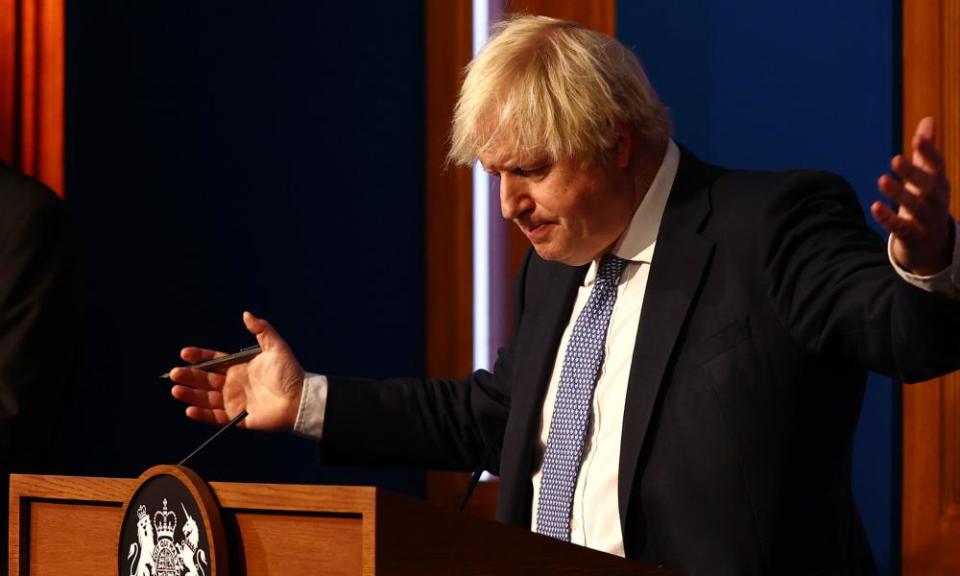Boris Johnson’s plan B arrives – but how much is it now undermined?

Boris Johnson’s decision to move England to plan B measures is hardly a widely controversial one. It has the backing of Labour, the Liberal Democrats, his scientific advisers and health officials, many of whom had been calling for it for weeks.
But many will be alarmed at the manner of the announcement – and the suspicion that it has been a distraction tactic relating to a political scandal.
Johnson’s cabinet left their meeting on Tuesday under the impression that plan B was likely but not imminent.
Related: What new Covid restrictions are coming into force in England?
But on Wednesday night, the prime minister, standing at the podium, announced the new restrictions. It was the same setting where viewers had seen on TV, 24 hours earlier, his staff joking last year about breaking the Christmas 2020 rules to enjoy cheese and wine – during a painful lockdown and surge in coronavirus infections.
One Whitehall official who saw the news about plan B breaking on Wednesday morning was left “aghast”. Not at the change itself, but at how difficult the prime minister had made it for government to communicate it effectively.
Vital messaging about booster Covid jabs had already been a casualty of the video, which had been unearthed by ITV. It showed Allegra Stratton, at the time the prime minister’s press secretary, joking at a briefing rehearsal about a festive party.
On Wednesday morning Sajid Javid, the health secretary, had been due on the broadcast round to announce that people over 40 could book booster jabs three months after their second vaccine. But his appearance was pulled amid the crisis unfolding over the video.
At the press conference itself, Johnson insisted it was the opposite of a so-called “dead cat” strategy. “Imagine the counterfactual,” he said. “People say we are somehow making this announcement to coincide with events in politics. Well, imagine that this step were to have been delayed because of political events. What would people say then? You have got to act to protect public health when you have clear evidence.”
The government’s scientific advisory group, Sage, had met on Tuesday, the prime minister said, describing that as the key moment in the decision-making.
The minutes of the meeting say that “preliminary modelling suggests that without any changes to measures in place, the number of hospitalisations from Omicron may reach 1,000 per day or higher in England by the end of the year (and still be increasing at that point)”.
The chief medical officer, Chris Whitty, and the chief scientific adviser, Sir Patrick Vallance, left no doubt that they supported the move and its immediacy.
For now, the minimal nature of the new restrictions means that little police enforcement will be needed and a bristling public will not be overly inconvenienced. In Scotland and Wales, nothing will change.
But the government could face serious difficulties in the coming days if further measures become necessary. The rules are already a mass of contradictions – people must work from home, but Christmas parties and nightclubbing can continue.
Johnson will hope, as some scientists do, that the coming school holidays and unilateral cancellation of many festive events will act as a kind of firebreak before he needs to impose even tougher rules – like the kind No 10 officials broke last year.

 Yahoo Finance
Yahoo Finance 